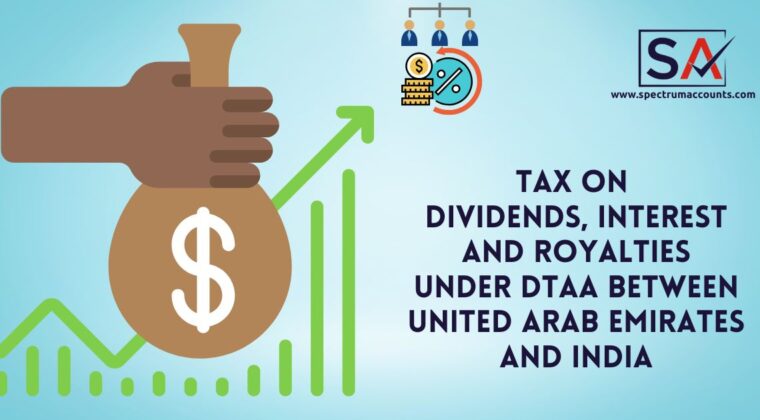What is the purpose of having an Agreement for Avoidance of Double Taxation and Prevention of Fiscal Evasion with UAE by India (DTAA) between UAE and India?
- In the Present Era of cross border transactions across the globe, the effect of Taxation is one of the important considerations for any Trade and Investment decisions in another countries.
- Where a taxpayer is resident in one country and but has source of income situated in another country, it gives rise to possible double taxation.
- DTAA lays down rules for taxation of the income by the Source country and the residence country.
- The Provisions of DTAA are compared with domestic law, assessee can opt for anyone which is beneficial to him.
This treaty was entered into by UAE and India with an aim to promote their economic relations and prevent tax evasion.

Scope
This DTAA agreement shall apply to persons who are residents of one or both of the Contracting States (UAE or India).
Taxes Covered
This agreement applies on the following existing taxes:
- Income Tax, Corporation Tax and Wealth Tax in UAE
- Income Tax and Wealth Tax in India

Following is the summary of the DTAA between UAE and India with respect to dividends, interest and royalty income:
|
Area of Income |
Income earned in | Income taxed in |
Remarks |
| Dividends | The Country where the recipient is resident | In the same Country where the recipient is resident | Exception:
Taxed in the contracting state where the company paying dividends is resident at a rate not exceeding 10% |
| Interest | The Country where the recipient is resident | In the same Country where the recipient is resident | Exception:
Interest may be taxed in the state in which it arises and shall not exceed -5% of gross interest if it is on bank loan -12.5% of gross amount in all other cases. |
| Royalties | The Country where the recipient is resident | In the same state where the income is earned | Exception:
Taxed in the contracting state in which they arise at a rate not exceeding 10% of the gross amount of royalties |

Article 10 – Dividends
- Dividends paid by a company which is a resident of a contracting state to a resident of other contracting state may be taxed in other state.
- However such dividends may also be taxed in the contracting state of which the company paying dividends is a resident, such dividends shall be charged at a rate not exceeding 10%.
- The provisions shall not apply if the Beneficial owner being a resident of a contracting state carries on business in other contracting state where the company paying the dividends is a resident through a PE situated therein or performs independent personal services.

Article – 11 Interest
- Interest arising in a contracting state and paid to a resident of other contracting state may be taxed in that other state.
- However such interest may be taxed in the contracting state in which it arises if the recipient is the beneficial owner of the interest and tax so charged shall not exceed
– 5% of the gross amount of the interest if such interest is paid on a loan granted by a bank or by a similar
Financial Institution and
– 12.5% in all other cases
- Interest arising in a contracting state shall be exempt from tax in that state provided it is derived and beneficially owned by
– The Government, a political sub-division, or a local authority of other contracting state or
– Central Bank of other contracting state.
- The provisions shall not apply if the Beneficial owner of the interest, being a resident of a contracting state carries on business in other contracting state in which the interest arises through a PE situated therein or performs independent personal services.

Article 12 – Royalties
- Royalties arising in a contracting state and paid to a resident of other contracting state may be taxed in other state.
- Such Royalties may be taxed in the contracting state in which they arise if the recipient is the beneficial owner of the royalties and tax so charged shall not exceed 10% of the gross amount of the royalties.
- The provisions shall not apply if the Beneficial owner of the royalties, being a resident of a contracting state carries on business in other contracting state in which the interest arises through a PE situated therein.

Elimination of Double Taxation
- Where a resident of India derives income or owns capital which, in accordance with the provisions of the agreement, may be taxed in UAE, India shall allow as a deduction from the tax on the income/capital of that resident an amount equal to Income tax or capital tax paid in UAE whether directly or by deduction.
- Where a resident of UAE which in accordance with the agreement may be taxed in India, UAE shall allow as a deduction from the tax on income of that person an amount equal to income tax paid in India.
- However such deduction shall not exceed that part of Income tax or capital tax as computed before the deduction is given.
Exchange of Information between the tax authorities of UAE and India
The competent authorities of contracting state shall exchange such information as is necessary for carrying out the provisions of the agreement or for the prevention or detection of evasion of taxes.

Limitation of Benefits
An entity which is a resident of a contracting state shall not be entitled to the benefits of this agreement if the main purpose of creation of such entity was to obtain the benefits of this agreement.

Why Spectrum Auditing?
Reach out to Spectrum Auditing for further details in order to assist you with information related to Double Taxation Avoidance Agreement (DTAA) between UAE and India. Call us today for any kind of assistance at +971 4 2699329 or email [email protected] to get all your queries addressed. Spectrum is your partner in your success.
AUTHOR

Managing Partner



 contact us
contact us